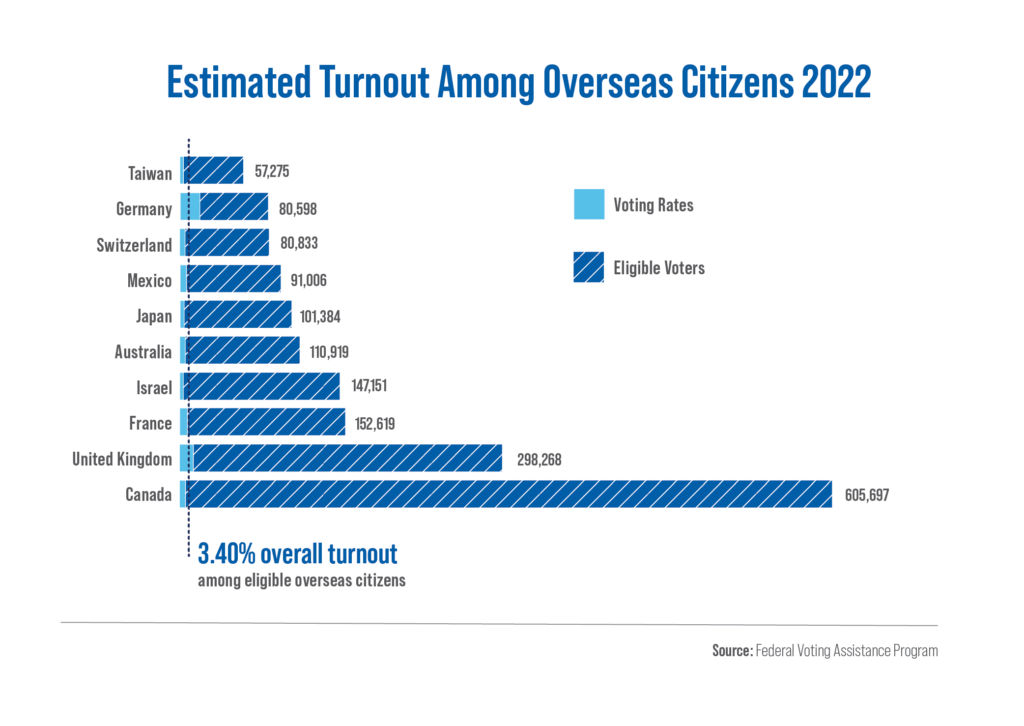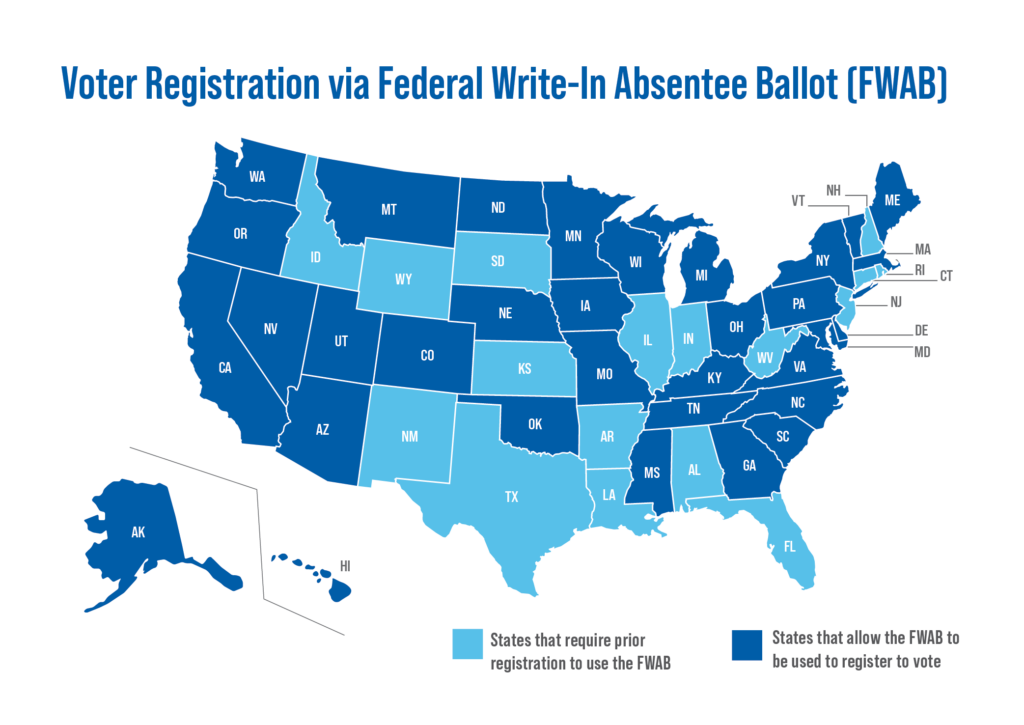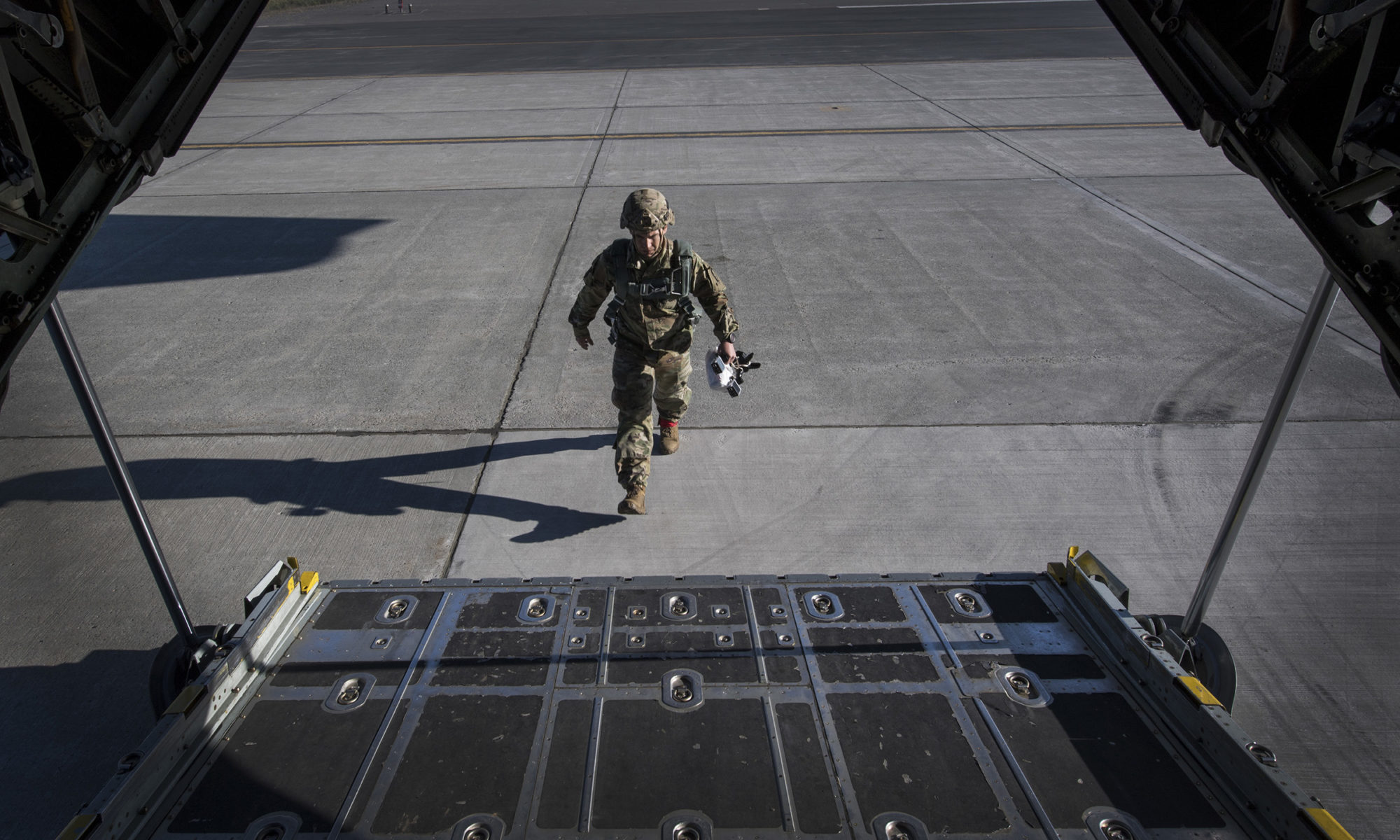By Rachel Wright, Policy Analyst
In 2022, nearly 4.4 million American citizens lived overseas. The Uniformed and Overseas Citizens Absentee Voting Act (UOCAVA) guarantees their right to vote absentee in federal elections, and like voters living stateside, many overseas citizens want to exercise this right. However, whether they are expatriates, students or peace corps volunteers, their path to the ballot box is often fraught with challenges.

For many voters, this path begins with the voter registration process. UOCAVA sets out to provide overseas citizens with a uniform and accessible means of registration by allowing them to use the Federal Postcard Application (FPCA) and the Federal Write-In Absentee Ballot (FWAB). The conditions surrounding registration deadlines, allowed return methods and validity periods, among other things, vary significantly among states.
Election officials often help overseas voters by reducing the challenges they face. The Overseas Voting Initiative (OVI) works closely with state and local election officials to better understand these challenges and share best practices related to overseas voting. Provided below are several common voter registration challenges faced by overseas citizens, along with strategies that working group members have developed to mitigate them.
International Mail System Reliability
Mail system reliability varies across countries and can pose a significant challenge for voters who return their FPCA via mail. The FPCA is a standard form developed by the Federal Voting Assistance Program (FVAP) that allows a UOCAVA voter to simultaneously register to vote and request an absentee ballot. It can be easily downloaded from FVAP’s website or accessed via your state or local election official’s website.
As of August 2024, three states — Alabama, Arkansas and Connecticut — only allow for an FPCA to be returned via mail. Voters in states that allow for electronic return may also default to mailing their FPCA if they are not sure of their state’s requirements. For these voters, utilizing an unreliable mail system may negatively impact the likelihood that their registration materials and ballot request will be received on time and by the proper election authority.
The impact of mail system reliability on the return of voter registration materials such as the FPCA is yet to be quantified. We do, however, know the impact it has on ballot success. A 2016 FVAP study found that overseas citizens in countries with the most reliable postal systems were 65% more likely to have a vote recorded compared to those in countries with the lowest observed levels of postal reliability. This figure, although stark, does not account for the number of voters who may not have received a ballot due to unsuccessful attempts to return their FPCA via mail.
Strategy 1: In states that allow for electronic return, election officials can encourage overseas citizens to return their FPCA electronically and communicate this information to voters via dedicated UOCAVA webpages and social media. Should a voter return their FPCA via email, election officials can use this touchpoint to establish open and consistent lines of communication to update voters on the status of their FPCA, upcoming deadlines and allowed return ballot methods. FVAP has developed an outreach toolkit for the 2024 election that contains email templates for these touchpoints. This toolkit can be accessed here.
Strategy 2: In states that do not allow FPCAs to be returned electronically, election officials can clearly communicate voter registration deadlines (including postmark deadlines, if applicable) via UOCAVA webpages and social media. They can also encourage voters to return their FPCA as soon as they leave the U.S., regardless of where they are residing overseas. Many overseas citizens live in countries with high postal system reliability; however, the COVID-19 pandemic has shown that mail disruptions can occur anywhere and at any point in time. Returning an FPCA as soon as possible can help mitigate potential negative impacts caused by unforeseen international mail delays.
The FWAB as an Alternative Means of Voter Registration
The FWAB is intended to serve as a backup ballot and alternative means to register to vote if a military or overseas citizen does not receive their absentee ballot in time to meet their state’s deadlines. In select states, overseas citizens are not allowed to use the FWAB if they haven’t already registered to vote. This variation can lead to confusion, especially if these requirements change from year to year.
For example, as of August 2024, 33 states allow UOCAVA voters to use the FWAB to register to vote. Those in the remaining 17 states must be registered to vote and have already requested a state absentee ballot to use the FWAB. This includes overseas citizens from Hawaii and New York who were not subject to this requirement prior to 2024.
Moreover, confusion grows when states have differing requirements based on the type of UOCAVA voter. For example, Wisconsin only allows uniformed service members and their family to use the FWAB to register to vote. Overseas citizens must already be registered to vote to use the FWAB and can only use the FWAB to vote in elections for federal offices. More information about these rules is available in the “2024-25 Voting Assistance Guide.”

Strategy 1: States can prevent confusion among overseas citizens surrounding whether they can use the FWAB to register to vote by instituting uniform requirements for all UOCAVA voters. This would entail allowing military service members, their family and overseas citizens to use the FWAB to vote in all elections for federal state and local offices, including ballot measures, regardless of whether the voter has registered to vote and requested a state ballot prior to using the FWAB. In doing so, states would simplify the voting process for overseas citizens and ensure all UOCAVA voters can utilize the same backup options.
Unintended Impacts of Automatic Voter Registration Systems
In states that utilize an automatic voter registration (AVR) system, UOCAVA voters may knowingly or unknowingly update their voter registration without realizing the unintended impacts it might have on their UOCAVA status. Although many systems allow voters to “opt-out” of automatic registration, many overseas citizens may not understand how automatic registration could impact their UOCAVA status and refrain from opting out.
For example, an overseas citizen may access a government service that uses the information gained throughout this transaction to update their voter registration. If the government agency does not collect information related to the voter’s UOCAVA status, their registration may be updated to indicate that they are a regular absentee voter. As a result, the overseas citizen may unknowingly be stripped of their UOCAVA status.
States and local jurisdictions have encountered similar issues with overseas citizens who renew their driver’s license or state ID online. In these instances, a voter has their new driver’s license or ID mailed to the address of a family member living stateside who then mails the ID to the UOCAVA voter. The DMV then uses the original mailing address provided to update the voter’s registration. In doing so, the voter may be stripped of their UOCAVA status, or, in some cases, registered as a voter in an entirely different jurisdiction.
Third-Party Organization Involvement in the Voter Registration Process
Third-party organizations may communicate with overseas citizens regarding voter registration, upcoming elections and approaching deadlines. These efforts are made in good faith, but may result in overseas citizens receiving confusing, conflicting or incorrect information.
For example, state and local election officials have seen an increasing number of overseas citizens who have registered to vote in presidential primaries explicitly for overseas citizens through third-party organizations (e.g., the Democrats Abroad presidential primary). Voters believe that voting in this primary constitutes registration for an upcoming presidential election. This, however, is not true.
This trend underscores the need for election officials to conduct effective outreach to overseas citizens and establish open lines of communication so that they receive the most up to date and accurate election information.
Strategy 1: To prevent these scenarios, state election officials can build check points into their AVR system that notifies a UOCAVA voter’s local election official if the system is attempting to update their registration. The voter’s local election official will then investigate (i.e., communicate with the voter) to ensure their registration is updated with the correct information. States such as Oregon have already implemented these control procedures into their AVR system.
Strategy 2: States can also prevent overseas citizens from being unintentionally stripped of their UOCAVA status by allowing an FPCA to remain valid and in effect through the end of the election year regardless of whether the voter is registered via their state’s AVR system in the interim. UOCAVA requires all states to abide by certain provisions related to the FPCA. However, states do have the authority to determine its period of validity. States such as West Virginia have already implemented this measure.
U.S. citizens living abroad face significant barriers when attempting to vote that may prevent them from participating in U.S. elections. For many voters, these barriers arise as early as the voter registration process and persist even after they have returned their ballot. Proactive engagement by election officials, clear and consistent communication with overseas voters, and simplifying the voting process are key to helping every voter exercise their right to vote.

